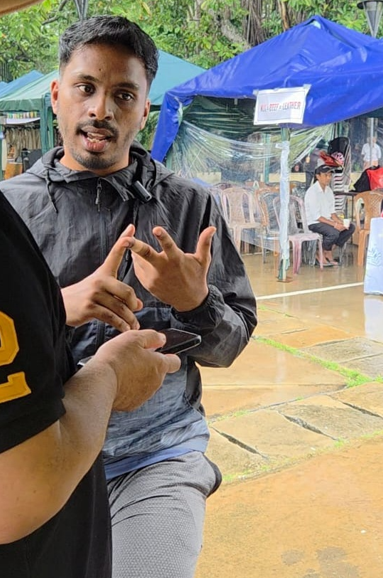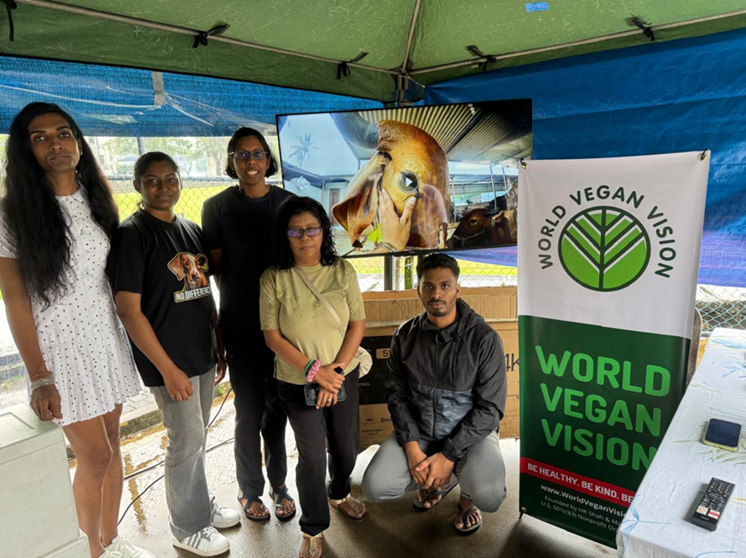By Tyron Devotta
Saturday mornings at the Good Market, next to the old Racecourse in Colombo, have long been a personal ritual — a small act of urban meditation. It’s where I rummage through second-hand books, sip mint flavoured lime juice, and eat ordinary Sri Lankan food dressed up in exotic form — rice and curry served in a biodegradable bowl that makes you feel like a foreigner in your own land. There’s always something unusual: a handmade trinket, a new herbal concoction, or a handmade dress that reminds us of how clothes were made in the good old days.
Last weekend, I stumbled on something different — a small, earnest group calling themselves “Friends of Animals.” They weren’t selling things. They were selling ideas. Their mission: to persuade people not to eat meat, drink milk, or wear leather. They called it a moral awakening; I saw it as courage — a group of young Sri Lankans trying to have a conversation most of us avoid.
They had set up a screen to play a 20-minute film on animal exploitation, promising vegan food samples for anyone who stopped to watch. Few did. Most marketgoers — clutching their smoothies and bags of brownies — passed politely, perhaps too afraid to face what they might see.
The Conversation at the Stall
The group, led by Qaya Bodhi, was remarkably well-informed and articulate. They are supported by World Vegan Vision, an international organization, and are a Good Market–approved vendor under the name Friends of Animals. Their goal, Qaya told me, is to create conversations about how humans and animals coexist in the modern world.
“We don’t realise how connected it all is,” he said, explaining what he called the “milk–beef–leather connection.” To paraphrase him: in order for a cow to produce milk, she must first be impregnated, usually through artificial insemination. Once the calf is born, it’s taken away so that humans can have the milk. The male calves, useless to the dairy industry, are slaughtered for veal or beef. The females are re-impregnated until their bodies give up — at which point they, too, are slaughtered, often for leather.
“It’s a closed cycle of suffering,” Qaya said. “And we pretend not to see it.”

Qaya Bodhi, Leader of Vegan Group “Friends of Animals”
The Weight of Tradition
In Sri Lanka, however, being vegan is not simply a moral choice — it’s an economic choice . Our diets, festivities, and religious offerings are steeped in meat and dairy. To tell a Sri Lankan family to give up milk tea or beef curry is to challenge centuries of tradition and, in some cases, identity itself.
A quick look at the numbers through an AI search explains the scale of what Qaya and his group are up against:
> The dairy sector costs Sri Lanka Rs. 58 billion annually in imports.
> The livestock and meat industry contributes roughly 1.2% to national GDP.
> The leather goods market is worth around US$ 30.8 million (≈ Rs. 9 billion).
That’s a multi-billion-rupee ecosystem built on the consumption habits of 22 million people.
So when Friends Of Animals ask us to “just stop,” it’s not just a moral request — it’s a challenge to one of the country’s oldest and most entrenched economic chains.
The Price of Being Good
Even for those willing to try, vegan living in Sri Lanka isn’t easy. Soya milk, the most affordable alternative, is very much higher than the cost of dairy, if you can even find it. On the day I met Qaya, it was missing from several supermarket shelves and unavailable online. The irony was striking: moral choice was on offer, but the market hadn’t caught up.
So where does that leave us? Becoming vegan is not just about willpower; it’s about access. Until plant-based products become mainstream, the idealism of veganism will struggle against the economics of convenience.
A Question of Conscience
What struck me most about Qaya wasn’t activism — it was reflection. He wasn’t angry or self-righteous; he was patient, almost philosophical. “I used to eat meat, drink milk, wear leather. I thought vegans were crazy,” he laughed. “But one day I realised I couldn’t find a single argument to justify it anymore.”
For him, veganism is not about superiority; it’s about integrity. “Even if there were no alternatives, doing the right thing would still matter,” he said.
Their vision isn’t about animal welfare — bigger cages or humane slaughter — but about animal rights: the idea that animals, as sentient beings, have a right to live free from human exploitation. It’s a radical notion in a country where milk is offered to gods and meat is offered to guests.
Between Idealism and Reality
As I left the market, I thought about that group — standing under a tarpaulin in the rain, trying to start a conversation few wanted to have. Perhaps they will never overturn the meat and dairy industries. Perhaps veganism will remain, for now, a niche conviction of the urban educated.
But maybe their purpose isn’t to convert — it’s to plant a seed of thought.
After all, every great shift begins as a conversation that most people aren’t yet ready to have.



